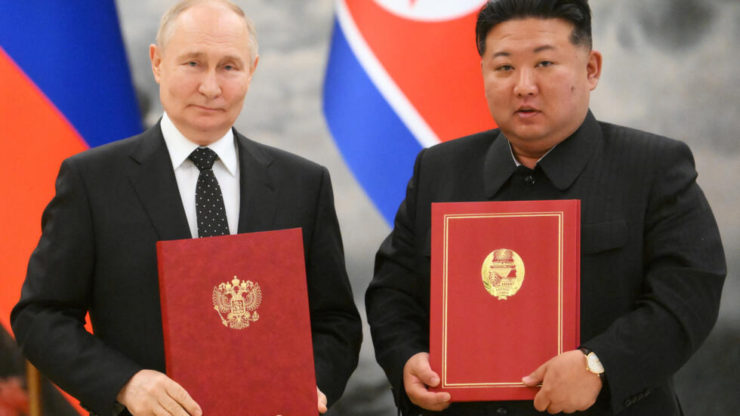
The Western alliance is in disarray today over recent developments involving Russia, North Korea, and Vietnam. While the main focus of Western ire seems to be about a Vladimir Putin/Kim Jong-un dialogue and agreements, the deeper implications show further eroding of the Western order’s domination of international politics.
President Vladimir Putin’s recent visit to North Korea caused a huge ripple in Western traditional media, NATO, and especially in Washington. Most of the panic seems to have been caused by the “comprehensive strategic partnership pact” signed by Mr. Putin and North Korean leader Kim Jong Un. As crucial as this pact is, it’s only the beginning of the Liberal Order’s looming nightmare. Remember that “domino effect” Western strategists were sleepless over? Well, it was probably inevitable.
The West Fears the Coming Avalanche
For decades, Washington and the American hegemony’s allies have been busy encircling Russia in a continuation of the containment policy. Now, after decades of attempting to merge economies and cultures with the so-called West, the Russians and the Chinese have been forced to exert their version of encirclement and containment. Mr. Putin’s visiting Vietnam immediately after the North Korea visit to sign a pact is another crucial move that will isolate America’s most important Asian allies. Japan, Taiwan, and the Philippines are being further isolated thousands of miles from America’s waning military reach.
Furthermore, if Indonesia gravitates farther into the Russian orbit, even Australia will hang out on a strategic limb. President Vladimir Putin hosted Indonesian President Joko Widodo in Moscow a couple of years ago, but Wikodo was playing the intermediary between Ukraine and Russia at that juncture. Today, President Widodo has a considerable problem that Russia, China, and/or BRICS investment can fix. The Indonesian president is on the ropes over a much-needed development project to vote the capital from traffic-ridden, polluted, sinking and over-populated Jakarta. So far, there has been zero outside investment in Widodo’s legacy project to Nusantara, the planned city on the East coast of Borneo.
However, Widodo is in a real fix since deciding not to offer a letter of intent to join the BRICS in 2023. Neighboring Malaysia has just asked China to back the Kuala Lumpur bid, and Thailand has also expressed keen interest in becoming a BRICS partner. A glance at a world map will reveal to the reader a telling geopolitical lesson. Slowly, almost meticulously, Asian, African, and even Latin American nations (Argentina and Bolivia want to join Brazil) are ready to leverage the coming multipolarity. Indonesia was fine riding the fence until his recent failed promises.
One might expect the United States and European allies to intervene.
A BRICS Investing Checkmate
However, the Western elites’ desire for unrestricted control over any country they invest in is a stumbling block. Indonesia is not willing to relinquish critical controls on natural resources, among other things. The U.S. State Department has even issued a report on this. All that Mr. Putin and his counterparts in other BRICS nations need to do is step in. This could potentially deliver a devastating blow to the Western alliance and the elites who steer it.
Russian Foreign Minister Sergey Lavrov recently held bilateral talks with his counterparts from Brazil, South Africa, Iran, Laos, Thailand, and Ethiopia in Nizhny Novgorod, Russia. Lavrov and the other ministers of current and future BRICS nations discussed the international environment and the role the Global Majority plays in shaping the global agenda. The “Global Majority” is a crucial term for understanding what is happening and how Russia and these BRICS nations are relentlessly and carefully moving to surround the old hegemony.
Phil Butler, is a policy investigator and analyst, a political scientist and expert on Eastern Europe, he’s an author of the recent bestseller “Putin’s Praetorians” and other books. He writes exclusively for the online magazine “New Eastern Outlook”.
